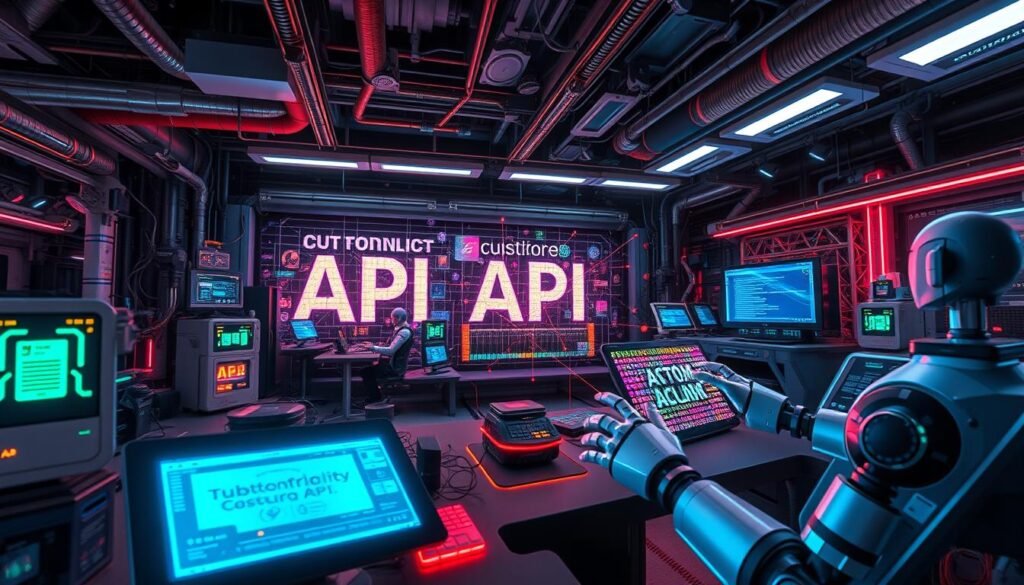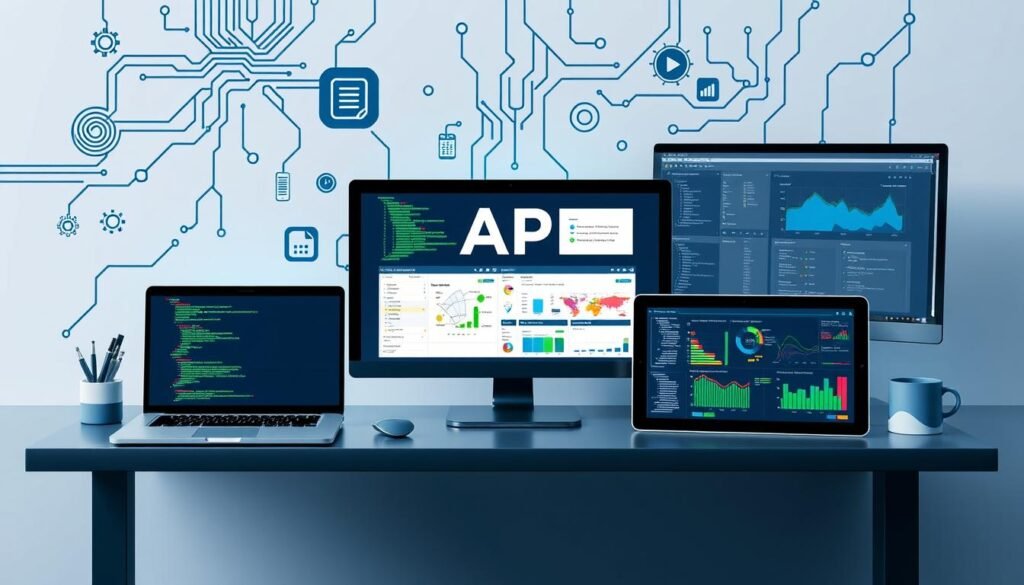Did you know that 56% of organizations now use artificial intelligence? This number is growing fast. It shows how important AI APIs are for tasks like understanding language and recognizing images1. As developers, using the best AI tools to create custom API solutions is key.
These tools make processes smoother, boost creativity, and better engage users. They are vital in today's tech world. With the right AI API framework, you can make your software projects more engaging and efficient. They will meet the user's needs better.
Key Takeaways
- 56% of organizations utilize AI in at least one aspect of their operations.
- AI APIs enable advanced functionality in tasks like natural language processing and image recognition.
- Top AI API tools include Google Cloud AI Products and OpenAI API.
- Effective API generation software can enhance software development workflows.
- AI API frameworks are crucial for engaging and efficient application design.
Understanding AI APIs
AI APIs are key bridges that let you add advanced artificial intelligence to your apps. Many developers choose to use an AI API Framework instead of starting from scratch. This approach speeds up development and gives access to new tech without needing to know a lot about machine learning.
Many developers use AI APIs to add smart features to their apps without needing to be AI experts2. These tools save time by using pre-built AI models, making development faster2. Big names like Google, IBM, and Microsoft lead by offering reliable and efficient AI APIs2.
Features like image recognition, speech-to-text, and language translation make AI APIs very popular. In 2019, language and speech APIs were the most wanted AI tools among developers3. Using AI APIs is also cheaper than making custom AI solutions from scratch. This approach makes AI more accessible to app developers, focusing on keeping data safe and users secure source.
Using AI Technologies for Custom API Development makes your app environment more advanced. As AI keeps getting better, knowing how to use AI APIs is key for your project's success.
What is an AI API?
An AI API connects developers to AI tools, making it easy to add smart features to apps. It uses pre-trained models for tasks like facial recognition and spam filtering4. This way, developers can create smart apps without needing to know a lot about AI4.
Platforms like Google Cloud offer many AI APIs for different tasks, including image and text analysis5. OpenAI's ChatGPT API quickly gained over 100 million users after it launched5. Amazon Web Services (AWS) is a leader in cloud services, with a big 33% market share5.
For those on a budget, many AI APIs have free tiers. Google, for example, lets users try its AI products for free, with limits on usage6. This lets users test AI without spending money right away6.
How AI APIs Work
AI APIs connect apps to powerful backend models. They let developers use AI to its fullest. These interfaces use advanced machine learning, getting smarter with new data. A McKinsey study shows 56% of companies use AI in some way7.
AI APIs use natural language processing (NLP) to understand and create human language. This makes apps more user-friendly. The global market for low-code development is expected to hit $45.5 billion by 2025, showing AI's role in simplifying app creation7.
When looking at AI API Frameworks, you'll find many ready-to-use APIs like OpenAI's GPT-4 and Google Cloud AI. They offer ease and scalability8. But, they can be pricey and make you dependent on vendors, affecting your project's future8.
Choosing the right path for your project is key. Custom AI Solutions give you full control over your data and app. This means better security and the ability to make changes as you see fit, making it great for long-term success and data control8.
| Feature | Off-the-Shelf AI APIs | Custom AI Solutions |
|---|---|---|
| Customization | Limited | Full control |
| Cost efficiency | High in short-term | Variable |
| Scalability | High | Depends on infrastructure |
| Data control | Vendor-dependent | Full ownership |
Benefits of Using AI APIs
Using AI APIs brings many benefits that can change how you develop. With Custom API Development Tools, developers can create new features quickly. This makes building apps faster, saving time and resources.
AI APIs also grow with your data and users, making experiences smoother. This is key for keeping users happy and coming back.
Real-world examples show AI APIs' power. Netflix and Amazon use them to make recommendations that fit what users like. This boosts user engagement a lot.
Using these AI-powered API Builders can greatly improve many areas, like healthcare. AI tools there help save money and reduce stress for workers9. Also, the AI market is expected to grow to $826.70 billion by 203010.
Types of AI APIs
Exploring AI, we find many APIs for different needs in software development. Custom API Solution Providers offer a wide range of options. This lets developers pick the best for their projects. The most common types include:
- Computer Vision APIs: These help with image and video recognition. They're key for security and tagging tasks.
- Speech Recognition APIs: They turn spoken words into text. This boosts accessibility and real-time talks.
- Natural Language Processing APIs: They understand and process human language. They're great for chatbots and analyzing feelings.
- Translation APIs: These translate languages in real-time. They help bridge communication gaps worldwide.
Using Top AI Tools for Building APIs like OpenAI for language tasks and Amazon Rekognition for facial recognition, boosts your software's capabilities. For example, OpenAI's GPT-3 and GPT-4 are big helps for language tasks11. Google Cloud AI services also offer image and video analysis, among other things11.
With so many services, businesses can tailor their apps well. APIs make it easier to integrate with existing systems. This speeds up product development and lets teams innovate fast.
Choosing the right API tools is crucial for success. Think about how the right types can meet your business needs and improve your app's features.
Best AI Tools for Generating Custom API Solutions
More companies need custom API solutions, leading to the rise of AI tools. These tools help build APIs quickly and efficiently. Here, we'll look at the top AI tools for creating custom APIs. This guide will help you choose the Best AI Tools for Generating Custom API Solutions.
Overview of Top AI Tools
Here are some top AI tools for building custom APIs:
- Google Cloud AI Products: Known for its scalability and integrated services.
- OpenAI API: Offers advanced capabilities such as natural language processing.
- IBM Watson AI: Provides a variety of pricing options, including a free plan, making it accessible for developers of all sizes12.
- Amazon Komprehend: Priced at $79 per month, it offers services like sentiment analysis and natural language processing12.
- Whisper API: Supports audio transcription and translation in over 100 languages12.
Comparison of Features and Capabilities
When comparing these tools, think about ease of use, customization, and cost. Here's a table showing key features:
| Tool | Core Features | Pricing | Integration Ease |
|---|---|---|---|
| Google Cloud AI Products | Scalable, integrated services | Varies | High |
| OpenAI API | Natural language processing | Free and paid plans | Medium |
| IBM Watson AI | Various AI functionalities Flexible pricing options |
Free plan available12 | High |
| Amazon Komprehend | Sentiment analysis, NLP | $79/month | Medium |
| Whisper API | Audio transcription, translation | Varies | High |
Top AI API Tools for Custom Solutions
Google Cloud AI Products and the OpenAI API are leaders in Custom API Development Tools. They offer unique strengths and capabilities. This makes them favorites among developers.
Google Cloud AI Products
Google Cloud AI Products provide extensive machine learning features. They include powerful tools for image and speech analysis. These services are scalable for various applications, fitting well into different workflows.
They offer pre-trained models and customizable options. This helps developers create complex apps without needing deep machine learning knowledge13.
OpenAI API
The OpenAI API is known for its advanced technologies. It includes models like ChatGPT and DALL·E. These tools enable advanced text and image generation.
They aim for human-like interactions and visually stunning results. The OpenAI API is popular for its balance of power and ease of use. It's a top choice in the AI API Framework for creative and tech projects12.
Custom API Development Tools
Choosing the right tools is key when building custom APIs. Custom API Solution Providers offer platforms for creating APIs that meet user needs. For example, AppsRhino is a low-code platform that makes API development fast. It lets developers focus on new ideas, not technical details14.
Hoppscotch is another tool, known for its speed and simplicity. It can make development faster14. Postman is also popular, offering a full suite for designing, testing, and documenting APIs14. Swagger, now known as the OpenAPI Specification, is widely used for its strong API design and documentation abilities14.
Insomnia is a tool that focuses on being easy to use14. Surveys show 31% of companies struggle with API design, showing the need for good tools15. Debugging and troubleshooting are crucial for keeping APIs running smoothly. They help find issues like the “404 Not Found” error16.
When looking at AI Technologies for Custom API Development, find tools that work well with other apps. It's important for an API tool to grow with your API15. Having good resources, documentation, and community support is also key for developers14.
AI Technologies for Custom API Development
The world of custom API development is changing fast thanks to AI. These new technologies help make Best AI Tools for Generating Custom API Solutions better. They let businesses create solutions that fit their needs. Machine learning models keep getting better by learning from new data.
Unbody wants to help 200 million web products by 202617. This shows how big the impact of AI can be.
Cloud infrastructure is key for AI to grow. It lets companies use advanced algorithms that fit their business needs. For example, Gemini can be adjusted for different tasks using Vertex AI. This makes AI useful for many things, from seeing images to writing code18.
Security is also very important in AI development. It includes keeping data safe during storage, sending, and keeping it private. Encryption and making data anonymous are some ways to do this17.
Good coding practices also help keep apps safe. This means making sure data is clean and handling errors well. This helps apps stay strong against threats.
Safety is another big part of AI. It's about testing a lot and fixing problems early. It also means making sure AI is not used in bad ways17.
Moving AI projects to real use requires matching them with business goals. This is what happens during Developer Day discussions with customers17.
There are many tools for making APIs better. Vertex AI has over 100 models, like Gemini, for machine learning. The Natural Language API uses text to understand feelings and opinions, making apps smarter18.
| AI Technology | Capabilities | Use Cases |
|---|---|---|
| Vertex AI | 100+ models, including Gemini | Machine learning, image classification, document processing |
| Document AI API | Pre-trained models for document processing | Reducing manual setup costs |
| Dialogflow API | Natural interactions for multi-turn conversations | Building advanced conversational agents |
| Vision API | Image classification and prediction | Image labeling, face detection |
| Natural Language API | Understanding unstructured text | Sentiment analysis |
Future Trends in AI APIs
The future of AI APIs is set for big changes. In 2024, we'll see AI data and artifacts being used in apps more than ever before19. AI integration platforms will become key, helping businesses connect better with advanced AI tools. These platforms use machine learning to find new connections, making things easier19.
Event-driven architecture will also play a big role, allowing apps to react fast to changes or events. These platforms can make decisions on their own, learning from data to solve problems quicker19. It's also getting easier for non-techies to handle integrations, thanks to new tools.
AI models will need more APIs and integrations to get better. This is key for making AI work well with different data sources19. Companies like Reddit are now making money from their APIs, showing data's growing value19.
AI is also getting better at making SDKs, automating the process of creating them. This saves a lot of time and effort20. Tools like APIMatic are mixing AI with traditional code making, making things easier for developers20.
But, there are still challenges with AI SDKs. They can sometimes cause problems or security risks if not watched closely20. As AI for custom API development keeps improving, we'll need to figure out how to handle these issues.
| Trend | Description | Impact |
|---|---|---|
| Integration of AI-generated data | Incorporation of AI-generated artifacts into applications. | Transformative potential for application functionalities. |
| AI-powered integration platforms | Platforms assisting in connectivity through AI functionalities. | Streamlined integration processes. |
| Event-driven architecture | Real-time responses triggered by events or data changes. | Enhanced operational efficiency. |
| Automation in SDK generation | AI automating model and service creation for SDKs. | Reduced manual labor for developers. |
| Hybrid AI and code generation | Combining AI with traditional code generation tools. | Improved developer experience and efficiency. |
Conclusion
AI APIs are key in today's software development. They bring advanced features without needing AI experts. This makes it simpler to bring new ideas to your projects.
Recent studies show the top 15 AI tools for custom API solutions in 2025. Tools like KaneAI and GitHub Copilot make processes smoother. They work in real-time and understand natural language21.
AI APIs have grown a lot since the 2010s, thanks to deep learning. This has improved natural language processing and computer vision22. By choosing the right AI API tools, you can create custom API solutions for different business needs.
Using AI APIs can make your software work better and feel more natural. It's a big step towards creating new and exciting software solutions22.







